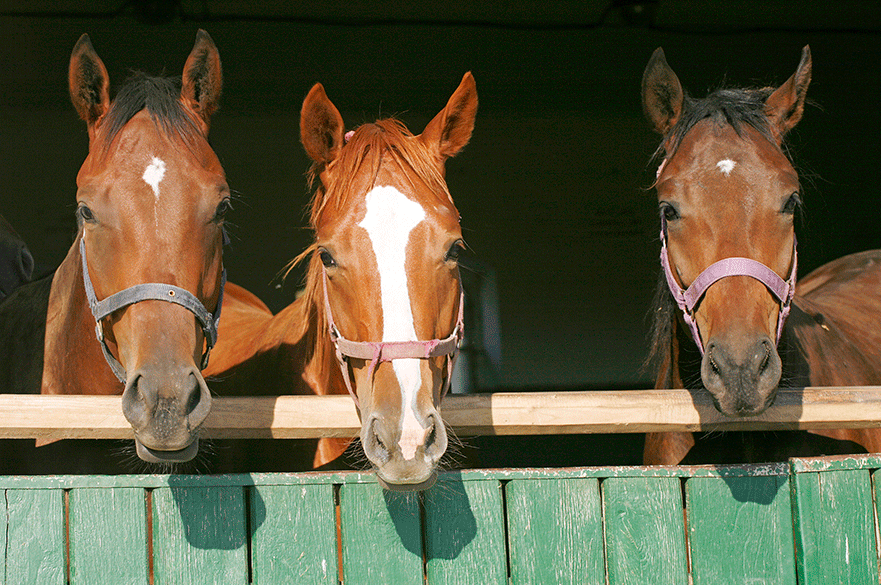Temperature ranges used to monitor horse health may be inaccurate, study suggests
Temperature ranges used as an important measure of equine wellness may be too high to represent healthy horses, British research suggests.
By Hayley Chipman | Published on 17 January 2019
Categories: Press office; School of Animal, Rural and Environmental Sciences;

Temperature ranges which are used as an important measure of equine wellness may be too high to represent healthy horses, a new study suggests.
Researchers at Nottingham Trent University and the Royal Agricultural University investigated the use of body temperature in assessing equine health, and argue that current tradition-based guidelines may be inaccurate and require further investigation.
Rectal temperature is a vital determining factor in the monitoring of horse health and allows early detection of infections and assessment of disorders such as colic.
While books and other sources have stated ‘normal ranges’ of temperatures for many years, there has been no recent published work looking to see if these suggested normal values are representative of healthy horses.
As part of the study Emily Hall, Dr Anne Carter and Dr Carol Hall from Nottingham Trent University, in collaboration with Dr Anne Stevenson from the Royal Agricultural University, researched the normal body temperature of horses on the NTU yard.
The findings showed that the upper limit of the published ranges (38.5°C) is typically 0.5°C higher than the results from clinically normal horses in this study. The researchers found the normal temperature range for horses on this yard was 36.0-38.0°C.
The research, which included over 600 measurements from 41 healthy adult horses, was led by the University's School of Animal, Rural and Environmental Sciences and is published in the Journal of Equine Veterinary Science.
Lead researcher, veterinary surgeon Emily Hall, said, "Due to factors such as antibiotic resistance, climate change, and ever-increasing movement of horses, it is increasingly important that early signs of ill-health or disease are picked up as early as possible.
“By establishing a reference range specific to the yard at NTU, we can now be more confident in identifying horses that are too hot, or too cold, and take appropriate action.”
The study found that the overall equine temperature reference ranges cited in textbooks may need reviewing and updating. The aim is to repeat this study on a number of other equine yards around the UK in order to review the overall normal range for all horses across the UK.
Notes for Editors
Notes to editors
Press enquiries please contact Hayley Chipman, on telephone +44 115 84 82844, or via email
About Nottingham Trent University
Nottingham Trent University (NTU) was named University of the Year 2017 at the Times Higher Education Awards, and Modern University of the Year in the Times and Sunday Times Good University Guide 2018. These awards recognise NTU for its high levels of student satisfaction, its quality of teaching, its engagement with employers, and its overall student experience.
NTU has been rated Gold in the Government’s Teaching Excellence Framework – the highest ranking available.
NTU is one of the largest UK universities. With 30,000 students and more than 4,000 staff located across four campuses, the University contributes £900m to the UK economy every year. It is one of the UK’s most environmentally friendly universities, containing some of the sector’s most inspiring and efficient award-winning buildings. 96% of its graduates go on to employment or further education within six months of leaving.
Our student satisfaction is high: NTU achieved an 88% satisfaction score in the 2018 National Student Satisfaction Survey.
The University is passionate about creating opportunities and its extensive outreach programme is designed to enable Nottingham Trent to be a vehicle for social mobility. NTU is among the UK’s top five recruiters of students from disadvantaged backgrounds.
NTU is home to world-class research, and won The Queen’s Anniversary Prize in 2015 – the highest national honour for a UK university. It recognised the University’s pioneering projects to improve weapons and explosives detection in luggage; enable safer production of powdered infant formula; and combat food fraud.
With an international student population of over 3,000 from around 100 countries, the University prides itself on its global outlook